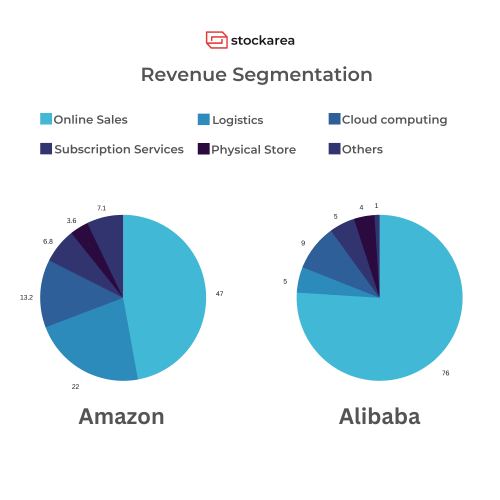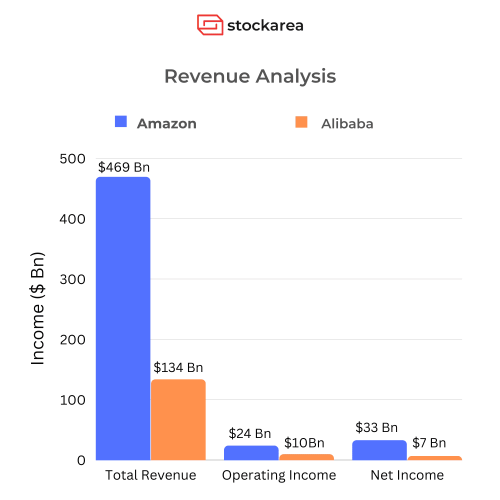Amazon and Alibaba are the two most prominent e-commerce companies today. Both companies have become e-commerce juggernauts competing for the top spot in the global e-commerce market. Amazon is a well-known international retail giant that accounts for 13% of the worldwide e-commerce market, whereas Alibaba is the market leader in China.
Alibaba is primarily focused on selling to businesses, whereas Amazon is customer-centric and sells products directly to consumers. Alibaba assists numerous small and medium-sized businesses, whereas Amazon prioritises the customer experience. Even though these businesses operate differently, their goal is identical: to become the largest e-commerce platform in the world. Let us see how they compete across various categories.
Amazon vs Alibaba: Business Model
Amazon and Alibaba surprisingly have different business models. Amazon has a B2C business model where it sells directly to consumers through its online storefront. Its primary focus is providing the best customer experience, and there are many services that Amazon offers to keep its customers happy. It has a vast network of fulfilment centres and delivery stations worldwide, allowing Amazon to take care of business logistics and retains a portion of the sales price as commission.
Conversely, Alibaba is a leading B2B marketplace connecting buyers and sellers worldwide, primarily in China. Its business model revolves around providing an online platform for businesses and merchants to list their products and services and facilitate deals. Alibaba takes a percentage of all transactions and earns revenue from the data associated with its online platform. The company also makes revenue through advertising and subscription fees. It also has a C2C platform called Taobao and a B2C platform called Tmall, which contains high-class brands.
Feature Comparison
1. International Presence
Amazon has a strong international presence in nearly 180 around the World. Amazon offers a wide range of products and services, including retail sales, cloud computing, and digital media, and has a local website for most of the countries it operates in. Alibaba’s international presence pales in comparison to Amazon. It has primarily an Asia-centric market, with nearly 80% of its revenue coming from China.
2. Customer Focus
Amazon is known for placing a great emphasis on customer service. They offer a wide range of customer-centric services like flexible delivery options, discounts, membership benefits and a wide range of products. Amazon also provides a smooth reverse logistics process and responds quickly to customer reviews and queries, adding to customer satisfaction. Customer satisfaction at Alibaba largely depends on its suppliers’ customer engagements; therefore, their customer service is unpredictable. In terms of customer focus, Amazon clearly outperforms Alibaba.
3. Retail Dominance
Amazon has shown a lot of development in the physical retail sector in recent years. It has nearly 600 retail locations across the globe. However, Alibaba has a significant brick-and-mortar presence. It has a grocery called Hema and has significantly invested in several hyper and supermarket chains. Nearly 5% of Alibaba’s revenue comes from physical retail, while Amazon’s physical stores make up only 3.6% of its revenue. Alibaba unquestionably dominates the physical retail sphere.
4. Value Added Services
Amazon and Alibaba have various value-added services such as subscription models, cloud services, streaming platforms and payment platforms. While Amazon’s membership models offer significant customer benefits, Alibaba provides a wide range of internet services such as digital marketing, web hosting and OS. Overall, both Amazon and Alibaba are at par in terms of value-added services.

5. Product Range
While both Amazon and Alibaba have a significant range of products, Alibaba’s unique business model allows them to offer a wide range of products and services across various categories. These categories include agriculture, business services, construction & real estate, energy, and fabrication services. The platform hosts thousands of businesses from different countries around the World, creating a vast variety of products and services.
6. Logistics
Amazon has made great strides in logistics. It runs a network of more than 185 fulfilment centres in over 20 countries, helping it to offer faster delivery options like same-day and one-day delivery. It also utilises third-party delivery services and works with a large number of carriers for domestic and international shipping. Amazon has invested heavily in its delivery capabilities, allowing it to reach customers quickly, and its drone delivery service, Prime Air, is expected to launch soon.
Alibaba has also made significant investments in logistics however, they are mostly limited to China. Alibaba has an international logistics arm, Cainiao Global, that works with a wide range of partners, including airlines and trucking services, to deliver packages worldwide. In terms of logistics, Amazon provides significantly superior global and local services compared to Alibaba.
Which Platform Is Better For Sellers?
Amazon has the widest global reach of these two platforms, giving it an edge. On Amazon, sellers can enjoy the convenience of Fulfillment by Amazon, which takes care of the entire logistics process. It is also easy to list and manage products on Amazon, and Amazon is well-known for its Prime service, which provides two-day shipping to customers in many regions.
On the other hand, Alibaba is more dedicated to wholesale and bulk orders, although it is possible to sell some items directly to customers. However, the buying process is more focused on negotiation, and buyers will generally look for a better deal than what Amazon offers. Plus, Alibaba’s logistics network is not as extensive as Amazon’s, so sellers may need to look for alternate shipping options.
Amazon Dethrones Alibaba In Revenue and Profitability
Amazon’s total revenue in the last fiscal year was about 469.8 billion USD, while Alibaba made about 134.5 billion USD. Amazon’s revenue increased by 9.4% compared to the prior fiscal year, while Alibaba’s revenue increased by 3%. Alibaba’s net income for the previous fiscal year was recorded at 7.42 billion USD showing a decrease of 24.04% compared to last year. Amazon’s net income, however, increased by 56.41% of the prior year, recording 33.4 billion USD. From these metrics, it is evident that Amazon beats Alibaba regarding revenue growth and profitability and is predicted to dominate these numbers in the upcoming years.

Will Amazon And Alibaba Continue To Compete?
Amazon and Alibaba are both giants in the e-commerce space, providing a range of products and services to consumers worldwide. While Amazon has the edge in terms of scale and reach, Alibaba has been able to leverage its strengths in China to take advantage of the burgeoning Chinese e-commerce market. Both companies have significant growth opportunities in emerging markets that have yet to be fully tapped and are likely to remain competitive rivals in the years to come.
Related posts
- 6 Key Benefits Of Printing Shipping Labels
- Beginners Guide To Sell On Amazon In 2024
- Complete Guide On Amazon Seller Central
- 7 Key Benefits Of Amazon FBA For Online Sellers
- Amazon Vs Walmart: Who Is Winning The Battle?
- 7 Simple Ways To Reduce Ecommerce Costs
- E-commerce Vs Retail: Which Is Better For Shopping?
- Top 10 Ecommerce Challenges For Your Business
- Top 15 Ecommerce Trends You Should Follow In 2024
- How To Start Ecommerce Business In India
- How To Sell Products Online: 2024 Ultimate Guide
- 10 Proven Tips To Grow Online Business
- What Is An Online Marketplace?
